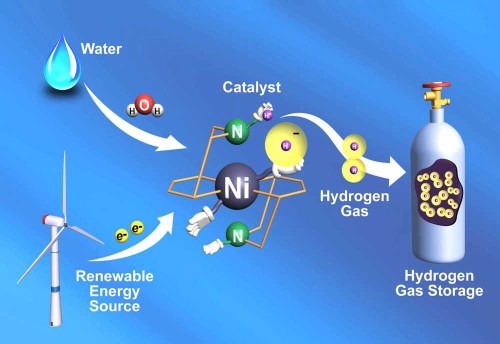Oregon defines ‘renewable hydrogen’ to help meet emissions targets
Published 9:00 am Friday, June 30, 2023

- A graphic representing how hydrogen is produced with renewable energy.
SALEM — An official definition for “renewable hydrogen” is on the books in Oregon.
State lawmakers passed House Bill 2530, which Gov. Tina Kotek signed into law May 19. The bill provides two definitions for “renewable hydrogen” and “green electrolytic hydrogen,” and directs the Oregon Department of Energy to apply for federal funding that would support the fuels’ development and use.
Those definitions closely align with those in neighboring Washington and California, said Dylan Kruse, vice president of Sustainable Northwest, which helped write the bill.
Having consistent definitions between states is important, Kruse said, because it maximizes opportunities for regional partnerships and projects on the West Coast.
HB 2530 also sets the tone for Oregon to embrace and adopt “green” hydrogen technology to meet its greenhouse gas reduction targets, Kruse said. The state has required that its two largest investor-owned utilities, Pacific Power and Portland General Electric, provide 100% emissions-free electricity by 2040.
“We need an all-of-the-above approach,” Kruse said. “Hydrogen is one (tool), in addition to what we already have in renewable electricity.”
Two definitions
Under the bill, “green electrolytic hydrogen” is defined as hydrogen produced by electrolysis — coursing electricity through water to separate the hydrogen and oxygen molecules — using renewable energy, such as wind, solar or hydro power.
“Renewable hydrogen,” on the other hand, can be made with a broader range of energy sources, including using biomass or renewable natural gas.
The Biden administration is already betting big on hydrogen, with the U.S. Department of Energy offering $8 billion in competitive grants from the Bipartisan Infrastructure Law to establish four regional hydrogen manufacturing hubs nationwide.
The DOE received 79 concept papers for hydrogen hubs last year. Of those, the department encouraged 33 projects to submit full applications.
Two of the 33 projects encouraged to submit full applications would be based in the Pacific Northwest. One, proposed by the Portland-based Obsidian Renewables, would establish electrolyzer facilities in Hermiston, Ore., and Moses Lake, Wash., powered by new wind and solar farms.
Another was pitched by the Pacific Northwest Hydrogen Association, a multi-state coalition that includes Oregon, Washington and Montana.
“It’s an exciting space,” Kruse said. “We’re seeing huge investment in this.”
Why hydrogen?
Michelle Detwiler, executive director of the Renewable Hydrogen Alliance, said hydrogen is key to achieving a 100% clean energy portfolio.
The alliance represents about 80 members, including project developers, utilities, public transit agencies, vehicle manufacturers, the Pacific Northwest National Laboratory and the Confederated Tribes of the Umatilla Indian Reservation.
Hydrogen can be a solution for de-carbonizing certain “hard-to-abate” sectors of the economy, Detwiler said, such as heavy industry, transportation and steel and cement production. “Green” hydrogen can also offset or replace the majority of hydrogen currently made from fossil fuels in the production of agricultural fertilizer and other chemicals.
Without hydrogen, Detwiler said states can only get to 80% clean energy.
“The interest in hydrogen has sort of waxed and waned over the decades,” she said. “But why it’s different now is because we have real statutory mandated requirements to reduce greenhouse gas emissions economy-wide. We can’t do it without hydrogen.”
Detwiler said passing HB 2530 was a step in the right direction.
“It’s important to know that hydrogen is not the answer to everything,” she said. “But it’s going to be a very, very important solution among many to realize the greenhouse gas emissions reduction goals that we have set for ourselves.”






